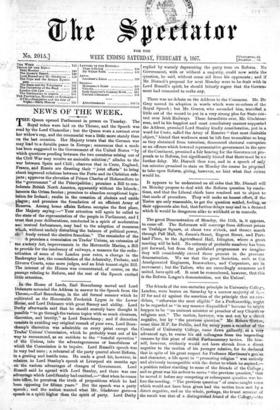In the House of Lords, Earl Beauchamp moved and Lord
Delamere seconded the Address in answer to the Speech from the Throne,—Earl Beauchamp, in the old formal manner which he cultivated as the Honourable Frederick Lygon in the Lower House, and Lord Delamere with great fluency and ability. Lord Derby afterwards said that he should scarcely have thought it possible "to go through the various topics with so much clearness, discretion, and brevity," as Lord Beauchamp ; and if discretion consists in avoiding any original remark of your own, Lord Beau- champ's discretion was admirable on every point except the Trades' Unions' Commission, which he probably went out of his way to recommend, as an antidote to the "baneful operation" of the Unions, into the advantageousness or banefulnees of which the Commission is to inquire. Lord Russell's speech was in very bad taste ; a rehearsal of the party quarrel about Reform, in a grating and hostile tone. He made a good hit, however, in relation to Lord Stanley's speech at Liverpool six months ago on the various advantages of changes of Government. Lord Russell said he agreed with Lord Stanley, and there was one advantage which Lord Stanley had omitted,—" that when he comes into office, he perceives the truth of propositions which he had been opposing for fifteen years." But the speech was a party speech ; and the nation wanted what Mr. Gladstone gave—a speech in a spirit higher than the spirit of party. Lord Derby
replied by warmly deprecating the party tone on Reform. No Government, with or without a majority, could now settle the question, he said, without some aid from his opponents ; and if Mr. Disraeli's proposal for next Monday were to be dealt with in Lord Russell's spirit, he should bitterly regret that the Govern- ment had consented to make any.






























